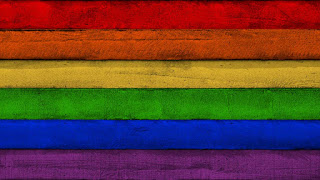Wednesday 12 July 2017
The Drag @ The National Theatre
Who knew that Mae West was such a brilliant queer playwright? Best known as an actress and Vaudeville star, West wrote a number of plays including this rarely performed work which was first performed at Poli's Park burlesque house in Connecticut in 1927 but closed after a handful of performances for violating obscenity laws. West even received a ten-day jail sentence.
The play was recently revived as a one-off rehearsed-reading by the National Theatre as part of its LGBT+ Readings season to mark the 50th anniversary of the partial decriminalisation of homosexuality in England and Wales. Even in this form, the play is a riveting comedy-drama that, under the direction of Polly Stenham, reveals West's bold writing and radical thinking.
In structure, this is a traditional comedy of manners in the spirit of Oscar Wilde or Noël Coward. The plot revolves around a socialite of the upper class - the son of a homophobic judge and married to the daughter of a gay conversion therapist - who revels in debauched parties, while his servants look on knowingly. The characters mostly perform to type (fools, schemers, jealous lovers) with little development, the focus instead on satire and witticisms. So far, so stiff.
And yet, as you'd expect from a sexual provocateur as West, The Drag is a scandalous affair. Its central protagonist is revealed to be homosexual, his marriage concealing a secret life of male affairs and drag balls. By subverting such a traditional genre, the implication is that, as one character remarks, gay people are all among us whether you know it or not. Nowadays this thinking is normality, but it was outrageous at the time.
Further, there's the sheer bawdiness of the humour. West's script is full of double entendres and innuendo - in particular, there are raucously funny scenes involving drag queens openly bitching and flirting with one another. It's bold and eccentric writing that in present day takes on new life: as a diverse audience we're in on the sly jokes offered with a wink, finding humour where before there was only horror.
What's most remarkable of all, though, is West's authenticity as a queer voice. The Drag encapsulates so much of queer culture from a woman who spent much of her time in queer spaces and was an advocate for gay rights. In writing the play, for instance, she employed specifically gay actors and it's not hard to image the drag scenes being improvised - it's like watching Ru Paul's Drag Race in sepia tones.
It's the seriousness of the monologues that are truly eye-opening, however, proving West isn't just a master of comedy. There's the doctor who, despite being a gay conversion therapist, offers radical views on the treatment of homosexuals as equals. There's the young man caught up in the affair, desperate, frightened, unsure of himself. And there's the seemingly omniscient female assistant to the doctor, perhaps representing West herself in the midst of the drama. In fact, it's not hard to read West's political views in much of the writing, most of all in the clashes with the judge character that could reflect West's own run-ins with the law.
The Drag is not just a riotously funny comedy that should be snapped up for a full performance by The National, it remains a hugely empowering piece of queer theatre some 90 years after it was written. Further, it's a play that cements West as both a key queer playwright and a writer far ahead of her time, fearlessly pushing boundaries no matter what the consequence. To use her own famous phrase, "when I'm good I'm very good, but when I'm bad I'm better".
Watch: The Drag was performed as part of The National Theatre's LGBT+ Readings season.
